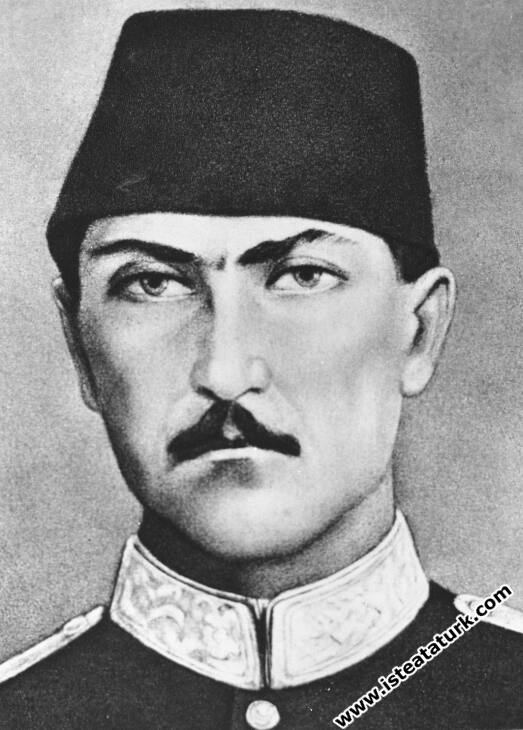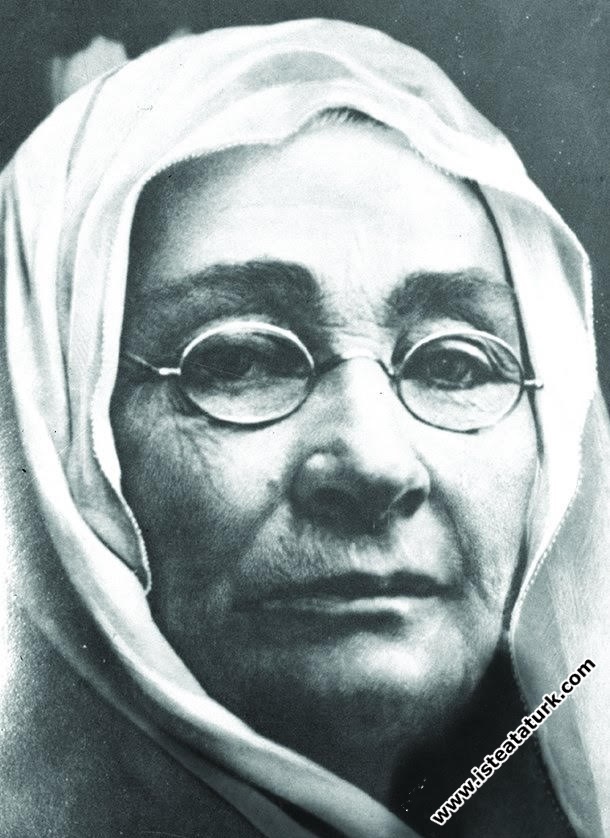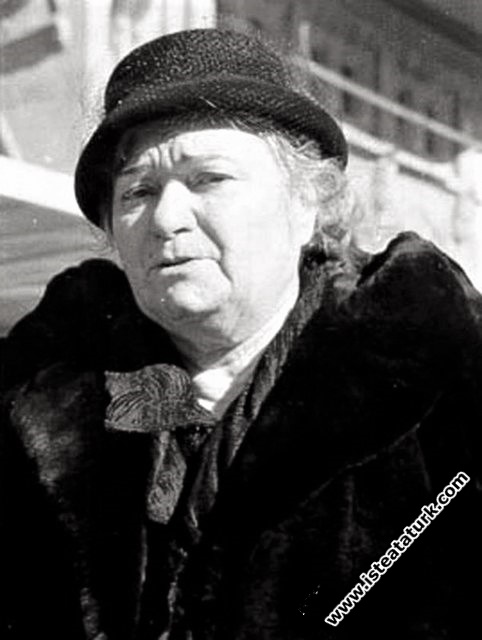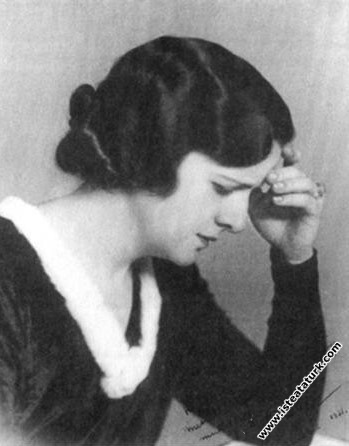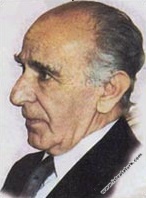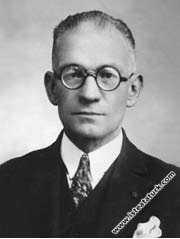
Mazhar Müfit Kansu (1873-1948)
Character Size
Life of Mazhar Müfit Kansu
MAZHAR MÜFİT KANSU (1873-1948)
Mazhar Müfit Kansu, who took important duties before, during and after the National Struggle, acted together with Mustafa Kemal Atatürk and other National Struggle heroes and wrote his name on the pages of history. According to his own statement, he was born in Denizli in 1873. His father is Süleyman Müfid Bey, who was the Director of the Registry in the relevant period, and his mother is Fatma Gülgam Hanım.
Mazhar Müfit Kansu, who started his education life in Fatih High School in Istanbul, continued his education in Edirne due to his father's appointment. After graduating from the High School, he entered the Civil Service High School and graduated with a high degree in 1889. Later, he completed the School of Civil Service in Istanbul.
He started his career as a History-i Natural and Hendese Teacher in Gallipoli High School and also served as the Deputy Director in Edirne High School in the same period. After a while, he left his teaching job completely and took part in the administrative part of the bureaucracy, and in May 1895 he became the Edirne Staff Officer. Meanwhile, Mazhar Müfit Kansu, who completed his internship at the District Governor's Office, was appointed as Havsa District Governor in 1897 when he was only 24 years old. His duty here lasted for four years and then he served as the district governor in Çorlu between 1901-1902 and Uzunköprü between 1902-1908.
While he was serving as Uzunköprü District Governor, II. The declaration of the Constitutional Monarchy caused great excitement in the region. Mazhar Müfit Kansu, who was also a member of the Committee of Union and Progress, II. While welcoming the declaration of the Constitutional Monarchy with great satisfaction; He tried his best to make the people understand the constitutional government. He organized a ceremony on the occasion of the proclamation of the Constitutional Monarchy, opened the Uzunköprü Liberty Monument and explained the meaning of the Constitution to the public and students in his speech on the occasion of the opening of the monument.
After Uzunköprü District Governorship, he was appointed as Xanthi District Governor in 1908. However, he did not stay in this position for a long time, and he was promoted to the governorship and his first place of duty was Komotini Sanjak. Afterwards, he served as the Governor of Lazistan (Rize) between 1910-1911, first of Mersin and then İzmit in 1911, and Balıkesir between 1914-1918.
After the Russian forces withdrew from the east of Anatolia, it was not possible to fill the administrative vacuum in the relevant regions immediately and completely, and some provinces began to be administered by the deputy governors for a while. Bitlis was one of these provinces, and the governorship was carried out by proxy by his secretary, Mümeyyiz Hakkı Bey. On April 11, 1918, Mazhar Müfit Kansu was originally appointed to this task. Hakkı Bey was trying to carry out the governorship affairs with a few civil servants, therefore, in order to eliminate the problems in the conduct of the affairs, Kansu first attempted to reorganize the provincial cadres. This period of time, when the First World War had not yet ended, was described by Kansu as a tense, anxious and restless atmosphere.
Since Mazhar Müfit Kansu was a member of the Committee of Union and Progress, like other members of the Committee of Union and Progress, the armistice period was made a natural target by the Istanbul press. While he was serving as the governor, news about his dismissal from this post was frequently published, and the hunt for the Unionist, which had started in Istanbul, finally extended to Mazhar Müfit Kansu. Meanwhile, IX. Mustafa Kemal Pasha, who was appointed as the Army Inspector, went to Samsun and then went to Amasya via Havza, and sent telegrams to the military and civil authorities in some provinces, and wanted to find out whether there were societies in favor of the National Struggle. One of these telegrams was sent to Mazhar Müfit Kansu, the Governor of Bitlis. The full text of the telegram is as follows; “Is there an organization of the Provincial-ı Şarkiye Müdafaai Hukuk Cemiyeti in the provincial centers, livas and annexes? Who are the main agents and representatives? Is it in communication and communication with the organization in the surrounding provinces? Are there other societies? I ask for their kindness to Bittahkik works.” Meanwhile, Kansu does not know Mustafa Kemal Pasha personally and does not know his views and thoughts. Due to the Unionist hunt that started in Istanbul and spread all over the country and Mustafa Kemal Pasha was officially appointed by the Government of the Sultan Vahideddin and Damat Ferid Pasha, he thought that he could not act outside the order of the Istanbul Government and the Sultan, and wanted to gain time in this way. In his reply to Mustafa Kemal Pasha, he simply said "I could not handle your encrypted telegram". The answer in question made Mustafa Kemal Pasha suspicious and wanted to get information from General Kazım Dirik about Mazhar Müfit Kansu, whom he did not know personally. Mustafa Kemal Pasha said, “This governor is probably not from us or he does not trust us. The telegram we sent him was very clear.” Upon these words, Kazım Dirik said that he knew Mazhar Müfit Bey and that his political views could not be different from theirs. The aforementioned telegram was sent by Kazım Dirik this time, but Mazhar Müfit Kansu gave him the same answer as he could not clear his doubts about the situation. Occupations across the country, threats and domination of the Allies, the arrest of members of the Union and Progress in Istanbul, and the insecurity among bureaucrats naturally pushed Mazhar Müfit Kansu to act cautiously.
Meanwhile, a person named Karabet Efendi, who claimed to be an Iranian citizen, complained to the Damat Ferid Pasha Government that he was deported, that his house and belongings were plundered, as was done to the Armenians, and cited Mazhar Müfit Kansu as responsible for this. Kansu was found guilty by the Government of Damat Ferid Pasha due to his deportation policy, and an order was sent to the governors of other provinces in Eastern Anatolia, demanding his arrest. Kansu, who was not aware of the situation yet, requested his dismissal from the Bitlis Governor's office on May 23, 1919, through the Bitlis Gendarmerie Commander Hasan Bey. However, Kansu has already been officially dismissed from his position as the Governor of Bitlis on May 3, but he is unaware of this dismissal. After learning that he was dismissed, he decided to go to Erzurum instead of returning to Istanbul, which he thought was dangerous for him. Reaching Erzurum on June 13, 1919, Kansu directly attacked the XV. He went to the Corps Commander Kazım Karabekir Pasha. Kazım Karabekir Pasha is one of the rare people Mazhar Müfit Kansu trusts in this insecure environment. Thus, the period in Kansu's life, in which he would advance on the path of the National Struggle, and his friendship with Mustafa Kemal Pasha would begin and they would be together until their death, began.
When Mazhar Müfit Kansu arrived in Erzurum, the preparations for the congress were continuing and Mustafa Kemal Pasha was still in Amasya. Kansu was making contact with the people of Erzurum by evaluating this period of time and trying to learn the ideas of the people on the defense of the homeland. Mustafa Kemal Pasha arrived in Erzurum on 3 July 1919. Mazhar Müfit Kansu, who met Mustafa Kemal Pasha for the first time here, expressed his satisfaction that Mustafa Kemal Pasha did not go to Istanbul and came to Erzurum to serve the country. Kansu was first given the responsibility of ensuring the security of the Congress. It is also known that he has undertaken various duties related to the healthy execution of the Congress process, apart from the relevant task.
While the congress process was continuing, the Government of Damat Ferid Pasha, with an order sent to the civil and military officials in Erzurum, demanded that Mustafa Kemal Pasha and the people who took part in the congress work be arrested for their actions and attitudes contrary to the Kanun-ı Esasi. Mazhar Müfit Kansu is among the people who are wanted to be arrested. The crimes against him are; The evaluation of the people with whom he acted in Erzurum as “revolutionary” consisted of his attitude towards the Armenian deportation and the allegations of forming armed gangs by deceiving the public and trying to make a revolution through these gangs while he was the Governor of Bitlis. In the face of the related allegations, it was decided that he should be tried in the Court of War and he was arrested and sent to Istanbul.
Mazhar Müfit Kansu was among the newly elected members of the Representative Committee after the national congress held in Sivas following the regional Erzurum Congress. After the Sivas Congress, Mazhar Müfit Kansu went to Ankara with Mustafa Kemal Pasha, where he carried out the financial affairs of the Representative Committee for a while, and then set out with İsmet Pasha to attend the last Ottoman Parliamentary Assembly in Istanbul.
Kansu, who joined the last Ottoman Parliament as a Hakkari Deputy, managed to secretly leave Istanbul and reach Ankara after the official occupation of Istanbul by the Entente Powers and the arrest of various deputies by raiding the Parliament, and on May 1, 1920, as a Hakkari Deputy, he succeeded in leaving the Grand National Assembly. He joined the Assembly.
Although Kansu was a deputy in the Grand National Assembly, he also undertook various duties besides being a deputy. For example, he undertook the duty of the Governor of Elazig for three months right after he participated in the works of the Assembly, went to Kayseri in case of the possibility of the Assembly to move to Kayseri, organized the preparations there, ensured that the aid collected by the people was delivered to the front, and became a member of the Yozgat Independence Court. He completed his work outside the Parliament on 23 July 1922 and returned to Parliamentary work. Kansu, who duly completed many of the duties given by Mustafa Kemal Pasha, also fell into disagreements with Mustafa Kemal Pasha at some points. For example, Kansu and some other supporters of the National Struggle thought that the task of the Representative Committee, which was formed during the National Congresses, should come to an end with the opening of the Grand National Assembly, but Mustafa Kemal Pasha said that the Committee of Representatives should be continued and there would be no change in this regard for the relevant period. was of the opinion that no action should be taken. As a matter of fact, the request of Mustafa Kemal Pasha had to be accepted by Kansu.
During the National Struggle, a survey was conducted to learn about the future expectations of the deputies and Kansu, who participated in this study, expressed his expectations from the future as follows; “He is committed to respecting the right of our venerable villager, whose lordship has been usurped by the unskilled for years, to return his lordship to him, and to the swift compilation and implementation of the laws that are necessary for the establishment of the administration, which will give the order to them, that is, it will go towards the people.” Kansu, who is obviously adopting a populist management approach, wants to save the management system from the hands of those he thinks are incompetent, by returning the rights that he thinks have been usurped by the people. It is very clear that this understanding is very important in terms of the conditions of the period, as it is an idea that is based on and includes the concepts of Republic and Democracy.
Kansu, who attaches great importance to the concepts of rights and justice, said that in many of his speeches in the Assembly, attention should be paid to these situations, the entire administrative system should be established within this framework by applying the merit method in all areas, equal access to education for children and the education system should be implemented carefully, teachers and civil servants should be paid on time, and regional Adjusting the salaries according to the relevant conditions, taking into account the conditions, supporting the orphaned children with better and craft education, adjusting the tax system according to the socio-economic situation of the region, bringing local governments to the forefront rather than the central government and strengthening these administrations,He argued that any discriminatory practice that might cause the public to suffer should not be recognized as a privilege, even to the deputies, and that gender equality should be ensured in all areas of life.
Kansu thought that the taxes collected from the people should be spent for the welfare of the people. Although it is possible to find many of his speeches on the relevant subject in the parliament, we will try to reflect his perspective on the situation in question with only two examples. Kansu, who strongly opposed the idea of increasing the amount of two thousand liras allocated to the Assembly Library to three thousand liras by Dersim Deputy Feridun Fikri Bey in the budget negotiations in 1924, said that it was not appropriate to buy books in the library with the public's money because many deputies did not read the books, that the allocated budget was sufficient, if more He stated that if there are parliamentarians who want to read a lot of books, they should also put their hands in their pockets and buy books. It is clear from the statements of Kansu, who is very keen on reading, that he strongly opposed this proposal, considering that it is not right to use the public's money for the deputies. Another example is that persons who are legally assigned a car make these cars available to people other than themselves (his family, neighbors) and that the cars in question are also used for inappropriate purposes. As an example of the use of the car other than its intended use, Kansu shows that by sending this car to buy a five cents lemon, one hundred fifty - two hundred cents from the state budget is spent as gasoline expenses.
Mazhar Müfit Kansu also expressed his ideas at a time when the Assembly was working to serve the public in the field of religion and trying to establish state affairs on the basis of secularism. According to him, although the related concept has different interpretations and different meanings among the people, secularism is not a non-religious thought or an understanding that rejects religion. It is clearly understood from the speeches Kansu made in the Parliament that he defended the secular order. On the other hand, in order for the people to learn their religion more accurately, especially for the correct translation of the Qur'an and hadiths, he requested the maximum use of the state's facilities and supported the passage of the budgets allocated for the related studies by the Parliament.
Although Kansu was suggested by Mustafa Kemal Pasha as a candidate for the Deputy Courthouse in the first Assembly and he did not accept this candidacy on the grounds that he did not have any specialization in the relevant field, he later served as a member of the Yozgat Independence Court and the President of the Eastern Independence Court.
While expressing his views on Turkey's relations with its neighbors in foreign policy, Kansu mainly focused on the issues between Greece and Turkey, and made his harshest criticism of an agreement signed between Turkey and Greece in 1930. He accused the Chief Deputy İsmet Pasha and his administration with the allegation that Turkey had to renounce some of its rights due to the issues stipulated in the relevant agreement. Kansu, who also assumed the duty of Treasurer in the Turkish Group of the International Parliamentary Union, found it wrong to be hostile on the basis of friendship in relations between other states and Turkey, however, in cases where the mutual goodwill required by the friendship conditions cannot be achieved, it has an understanding advocating that the said problems be resolved in favor of Turkey without compromise. In line with Mustafa Kemal Atatürk, he tries to act in line with the goal of a very sensitive, national, open and honest policy understanding on national issues.
Kansu, who joined the first parliament as a Hakkari deputy, served as a Denizli deputy in the II., III., IV. He was also a deputy of Artvin (Çoruh) during the periods. VII. After the term, he said goodbye to active political life at the age of 72. During his deputyship, he took active roles in various commissions within the Assembly, as well as, as it can be seen, in many works outside the Assembly.
It is known that before the surname law was enacted, Kansu also used the family name "Nakipoğulları". After the enactment of the surname law, Dr. Mazhar Müfit Kansu's relative. Şevket Aziz Bey chose the surname "Kansu" and shared it with Mazhar Müfit Kansu, who presented it to Mustafa Kemal Atatürk and Atatürk gave the family the surname "Kansu" with a paper he signed in his own handwriting.
.jpg)
The friendships that started with Mustafa Kemal Pasha in Erzurum continued until his death, and during this process, the relationship between Mazhar Müfit Kansu and Mustafa Kemal Atatürk remained very close. As mentioned, except for a few issues, they did not have a very serious disagreement. He continued the national and populist understanding, which Kansu continued during his parliamentary term and highlighted under all circumstances, on the line of Mustafa Kemal Atatürk.
Having a witty personality, Kansu is also a good orator. He is curious enough to learn how to play the piano, and is stubborn enough not to change his mind on some issues. After leaving political life, he died on 12 November 1948 while he was still serving as a Member of the Board of Ziraat Bank. He also contributed to a better understanding of the History of the Republic of Turkey by publishing a large part of his memoirs in the Son Telegraf Newspaper before he died.
Ahmet SEZGİN
KAYNAKÇA
ÇOKER, Fahri, Türk Parlamento Tarihi, Millî Mücadele ve TBMM I. Dönem 1919-1923, Cilt III, Türkiye Büyük Millet Meclisi Vakfı Yayınları, Ankara.
DENİZLİ, Hikmet, Sivas Kongresi Delegeleri ve Heyet-i Temsiliye Üyeleri, T.C. Kültür Bakanlığı Yayınları, Ankara 1996.
İlk Meclis Anketi Birinci Dönem TBMM Üyelerinin Gelecekten Bekledikleri, Yay. Haz. Cihangir Gündoğdu, TBMM Kültür, Sanat ve Yayın Kurulu, Ankara 2004.
KANSU, Mazhar Müfit, Erzurum’dan Ölümüne Kadar Atatürk’le Beraber, Cilt I-II, Türk Tarih Kurumu Yayınları, Ankara 1966.
Meclis-i Mebusan Zabıt Ceridesi, IV. Dönem.
SARIHAN, Zeki, Kurtuluş Savaşı Günlüğü, Cilt II, Türk Tarih Kurumu Yayınları, Ankara 1994.
SEZGİN, Ahmet, Denizli Milletvekili Mazhar Müfit Kansu ve Siyasi Faaliyetleri (1923-1939), Denizli Büyükşehir Belediyesi Kültür Yayınları, Denizli 2016.
Son Telgraf Gazetesi
TBMM Milletvekilleri Hal Tercümeleri.
TBMM Milletvekilleri II., III., IV., ve V. Dönem Seçim Mazbataları.
TBMM Zabıt Ceridesi, I., II., III., IV., ve V. Dönem.
YAVUZ, Nurcan, I. Dönem Türkiye Büyük Millet Meclisi’nde Hakkâri Mebusu Mazhar Müfit Bey’in Faaliyetleri, Basılmamış Yüksek Lisans Tezi, Atatürk Üniversitesi Atatürk İlkeleri ve İnkılap Tarihi Enstitüsü, Erzurum 1990.
